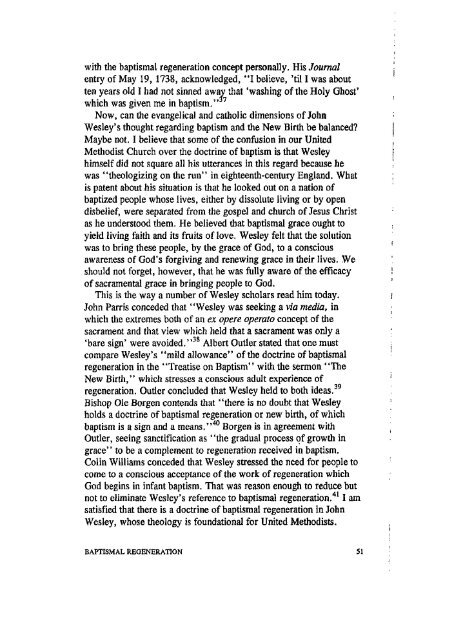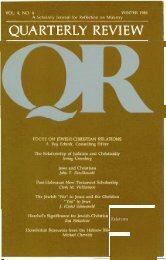TJieodore W. Jennings, Jr. The Meaning of ... - Quarterly Review
TJieodore W. Jennings, Jr. The Meaning of ... - Quarterly Review
TJieodore W. Jennings, Jr. The Meaning of ... - Quarterly Review
You also want an ePaper? Increase the reach of your titles
YUMPU automatically turns print PDFs into web optimized ePapers that Google loves.
with the baptismal regeneration concept personally. His Journal<br />
entry <strong>of</strong> May 19, 1738, acknowledged, "I believe, 'til I was about<br />
ten years old I had not sinned awav that 'washing <strong>of</strong> the Holy Ghost'<br />
which was given me in baptism.'<br />
Now, can the evangelical and catholic dimensions <strong>of</strong> John<br />
Wesley's thought regarding baptism and the New Birth be balanced?<br />
Maybe not. I believe that some <strong>of</strong> the confusion in our United<br />
Methodist Church over the doctrine <strong>of</strong> baptism is that Wesley<br />
himself did not square all his utterances in this regard because he<br />
was "theologizing on the run" in eighteenth-century England. What<br />
is patent about his situation is that he looked out on a nation <strong>of</strong><br />
baptized people whose lives, either by dissolute living or by open<br />
disbelief, were separated from the gospel and church <strong>of</strong> Jesus Christ<br />
as he understood them. He believed that baptismal grace ought to<br />
yield living faith and its fruits <strong>of</strong> love. Wesley felt that the solution<br />
was to bring these people, by the grace <strong>of</strong> God, to a conscious<br />
awareness <strong>of</strong> God's forgiving and renewing grace in their lives. We<br />
should not forget, however, that he was fully aware <strong>of</strong> the efficacy<br />
<strong>of</strong> sacramental grace in bringing people to God.<br />
This is the way a number <strong>of</strong> Wesley scholars read him today.<br />
John Parris conceded that "Wesley was seeking a via media, in<br />
which the extremes both <strong>of</strong> an ex opere operato concept <strong>of</strong> the<br />
sacrament and that view which held that a sacrament was only a<br />
'bare sign' were avoided." 38<br />
Albert Outler stated that one must<br />
compare Wesley's "mild allowance" <strong>of</strong> the doctrine <strong>of</strong> baptismal<br />
regeneration in the "Treatise on Baptism" with the sermon "<strong>The</strong><br />
New Birth," which stresses a conscious adult experience <strong>of</strong><br />
regeneration. Outler concluded that Wesley held to both ideas. 39<br />
Bishop Ole Borgen contends that "there is no doubt that Wesley<br />
holds a doctrine <strong>of</strong> baptismal regeneration or new birth, <strong>of</strong> which<br />
baptism is a sign and a means." 40<br />
Borgen is in agreement with<br />
Outler, seeing sanctification as "the gradual process <strong>of</strong> growth in<br />
grace" to be a complement to regeneration received in baptism.<br />
Colin Williams conceded that Wesley stressed the need for people to<br />
come to a conscious acceptance <strong>of</strong> the work <strong>of</strong> regeneration which<br />
God begins in infant baptism. That was reason enough to reduce but<br />
not to eliminate Wesley's reference to baptismal regeneration. 41<br />
1 am<br />
satisfied that there is a doctrine <strong>of</strong> baptismal regeneration in John<br />
Wesley, whose theology is foundational for United Methodists.<br />
BAPTISMAL REGENERATION 51












